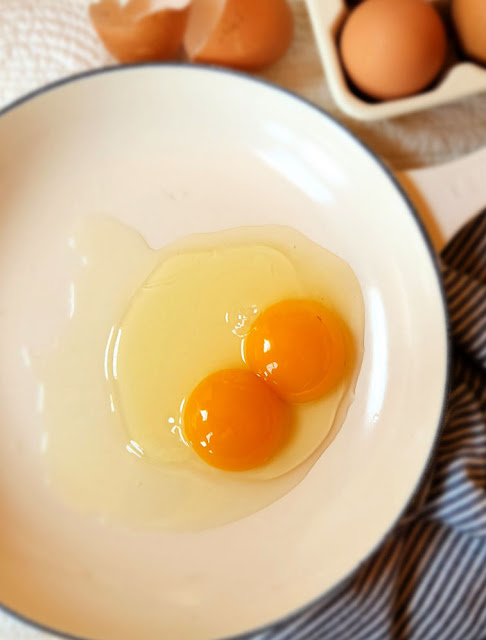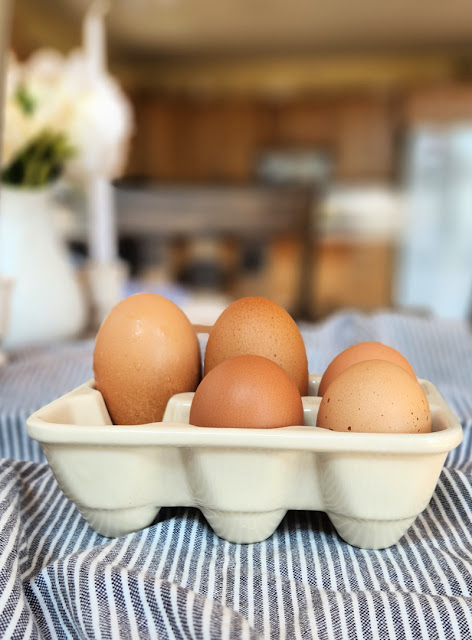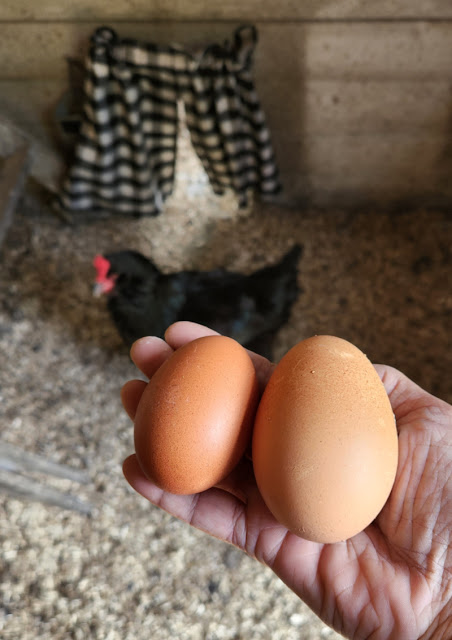Double yolked eggs are not terribly common, but if you raise chickens, you'll likely find a few from time to time.
Annie, one of our Australorps, has always been a big girl who lays big eggs. So when she laid a whopping 4.2 ounce egg one day last week, I wasn't all that surprised.
It turned out to be a double-yolk egg. Then yesterday she laid another giant 4.1 ounce egg, that dwarfed even our duck eggs. It also had a double-yolk.
So I decided it was time to share what I know about double-yolk eggs, because I'm sure many of you have found one in the nesting box on occasion.
They're usually pretty easy to pick out just based on size alone. While they won't always be twice as large as a regular egg, they will definitely be visibly bigger.
All About Double Yolk Chicken Eggs
Since commercially-sold eggs in the United States are sold by weight and also candled prior to packaging, any double-yolk eggs are discarded (although in the UK they are not) and you could go an entire lifetime eating store bought eggs and never encounter one.
However in Hong Kong and India, chickens are actually bred to lay double-yolked eggs that are highly sought after by customers.
What's the Chance of Finding a Double Yolk Egg?
If you start raising your own backyard flock, chances are you'll collect your share of double yolk eggs. It's estimated that roughly one in every thousand eggs (about .1%) is double-yolked.
But in nearly five years of raising backyard chickens, and collecting hundreds upon hundreds of eggs, I've only seen a handful of double-yolkers.
However, I recently was contacted by New Age composer Alex Shapiro who told me that she just collected a whole carton of eggs that contained 10 double yolkers! What are the chances of that?
What Causes a Double Yolk Chicken Egg?
A double-yolk egg occurs when two egg yolks are released into a hen's oviduct too close together and end up encased within the same shell.
Generally about an hour after an egg is laid, the next yolk is released, but due to hormonal change or imbalance, an overstimulated ovary sometimes misfires and releases the yolk too early.
Therefore, the shell forms around both yolks and results in a single egg.
It's far more common to find double-yolked eggs from new layers or those hens on the tail end of their laying life.
It can be genetic, and therefore hereditary, and is more common in the hybrids and heavier breeds.
Will Double Yolk Eggs Hatch into Twins?
Double-yolk eggs generally won't hatch if incubated, and if they do, both chicks usually don't survive, although it's possible.
Hens who lay large or double-yolked eggs are more prone to becoming egg bound or suffering vent prolapse, both potentially fatal afflictions.
I admit that I am a bit worried about Annie.
Her regular eggs are huge, weighing about 2.6 ounces, but now that she's started laying gigantic double-yolk eggs on occasion, there's a far better chance she will get egg bound or an egg will break inside her, causing peritonitis.
But there's not much I can do but keep a very close eye on her for any signs of distress and be sure she doesn't get overweight, which can also lead to egg binding.
As you can see from the standard egg size chart above, even Annie's normal 2.6 ounce eggs are considered to be in the jumbo category - and her 4 ounce eggs are off the charts!
Are Double Yolk Eggs Safe to Eat?
Double yolk eggs are most definitely safe to eat. Annie's our best layer and I save her eggs to make fried egg sandwiches for breakfast usually on Sundays.
Our smaller eggs I use for scrambling, omelets or baking. Since baking is so precise, it's not generally recommended to use double yolk eggs for baking since the yolk/white ratio is different than for a regular egg, so even if you weigh out the egg, your recipe still might not come out right.















